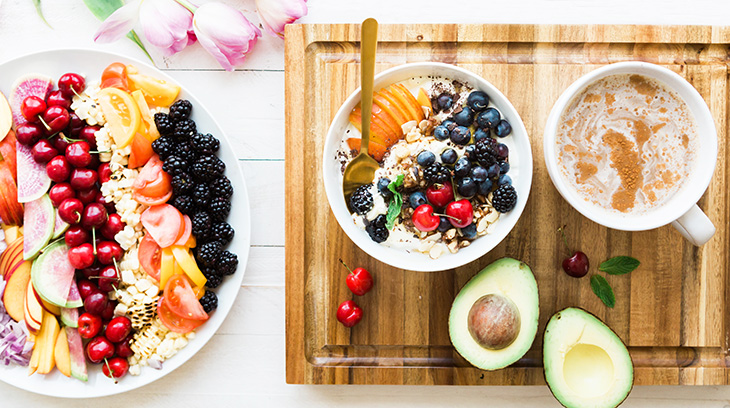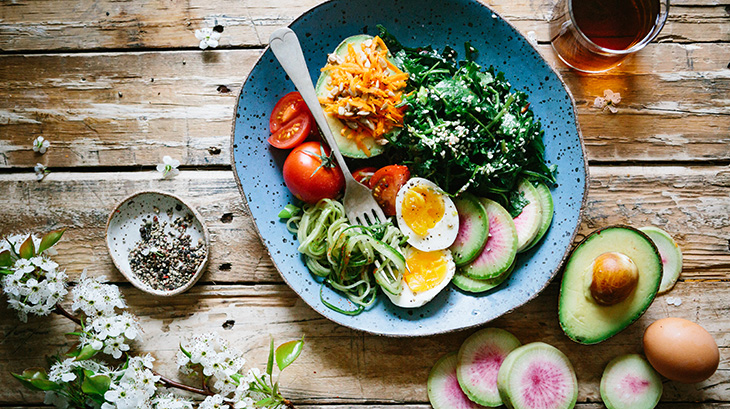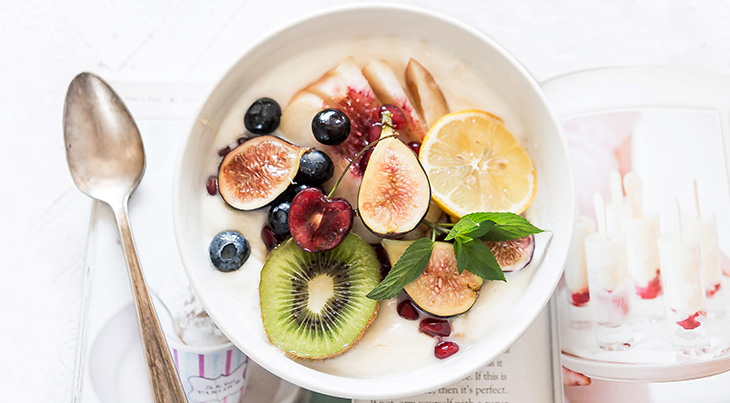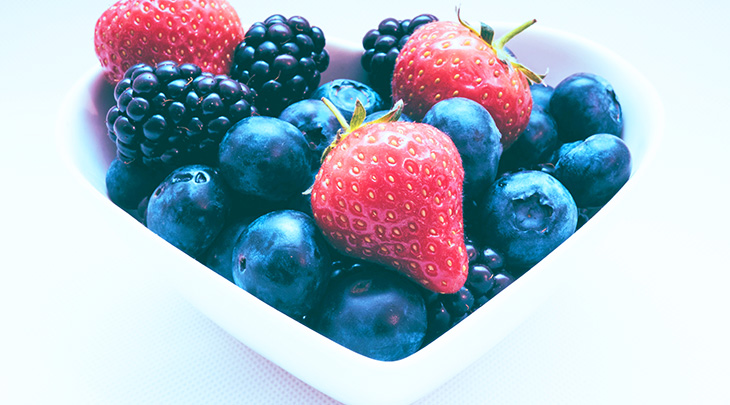Best Tips to Create Good Eating Habits
Although new healthy eating habits can be formed in less than a month, the reality for most of us is that years of bad eating habits (many of them formed in childhood), are not so easily wiped out.
Identifying these good – and bad – eating patterns, and 9 guidelines for formulating a personalized menu plan, will help you to gradually establish new healthy eating habits that you’ll be able to stick with.
(Berries in Heart-Shaped Bowl Photo: Jamie Street)
Eating habits are inextricably linked with human psychology. They come from customs, religion, food, and even fashion. Each nationality has its own cultural traditions, its own favourite cuisine, passed down from generation to generation, that has become a food habit.
Diet can vary significantly in each family. Such an ingrained habit, often completely unhelpful, accompanies a person for many years of life. Gaining excess weight, loss of health, loss of former attractiveness – all of this forces a person to reconsider their eating habits and sometimes completely change them.
Bad Eating Habits and How to Fix Them
Eating mindlessly
Cornell University psychologist Brian Wansink discovered that the larger the bowl or plate is, the less consciously you eat. In one recent work, he noted that moviegoers who eat popcorn from huge bags eat 45% more than those who eat fresh popcorn from small containers.
- Take a smaller plate and never eat directly from the food container or packaging.
Night visits to the refrigerator
All diets out there strictly forbid eating at late hours. It is a well-known fact that night visits to the refrigerator can’t bring you anything good. A lot depends on the products you eat at night too. Scientists at Northeastern University found that mice (essentially nocturnal animals) fed a high-fat diet during the day gained weight faster than their counterparts fed the same diet at night. For people, everything will be exactly the opposite.
- Train yourself to think that after dinner the kitchen is closed for the night.
- Brush your teeth – this dulls the feeling of hunger.
- If there is an irresistible desire to run to the refrigerator, endure it at least 10 minutes, and if it persists, then eat a small piece of apple or cheese.
Endless snacking
Almost the entire adult population can be blamed for this. We love snacking on the go or at at the TV, often with high-calorie density foods and empty carbs. A recent study from the University of North Carolina demonstrates that this problem is increasingly affecting children. They are likewise drawn to chips, candy, and soda. Therefore, from childhood, teach them to eat vegetables and not pounce on food.
- Keep only healthy snacks on hand (hummus, cucumber slices, apples, unflavored yoghurt, peanuts or almonds).
- Never leave your favourite less-healthy foods, such as chips or chocolates, within walking distance.
 (Healthy Breakfast Foods / Fruits Photo: Brooke Lark)
(Healthy Breakfast Foods / Fruits Photo: Brooke Lark)
Skipping breakfast
Everyone must have been taught in childhood that breakfast is the most important meal. But with the abundance of things to do in the morning, many people simply ignore this stage of the day. And it’s very bad. If you don’t eat at all in the morning, your metabolism starts to slow down. Yes, there are some intermittent fasting schemes that are often practiced for losing weight, but at the initial stage of changing your eating habits, it is better not to use them. Most likely, you will simply overeat at lunch if you skip breakfast.
- Cook breakfast the evening before & refrigerate it, so you can quickly re-heat it the next morning.
- Eat something light and low-fat such as yoghurt, protein shakes, oatmeal with banana, milk, etc.
Emotional hunger
This is the name of the habit of countering stress and bad mood with food. And this is not the most appropriate diet strategy. Emotional hunger has nothing to do with physical hunger, so it makes you overeat – this is the so-called compulsive overeating. under its influence, people eat simply for the taste of their favourite food and to feel better. And usually it’s not a tomato salad, but some nuggets or a whole pack of ice cream.
- Look for a different stress booster. For example, go for a walk or beat a punching bag in the gym.
- Even just going to bed, if you are exhausted to the limit, will be more useful than overeating again.
Eating too fast
Your appetite doesn’t give your brain time to catch up with your stomach. As a result, it starts signaling that you are full 15-20 minutes after the start of the meal. If you swallow your serving in less than 10 minutes, you will likely eat more than you need to. In a study of 3,200 men and women in Japan, it was found that eating food too quickly correlated with being overweight. In addition, if you do not chew your food properly, it is poorly absorbed.
- To slow down the eating process, from time to time, put down your fork.
- Try to pick up small pieces and chew each one thoroughly.
- Try to drink after every bit – this way you will definitely slow down the pace of your meal.
Poor sleep
Can lack of sleep affect nutrition? It very well can. The same study by researchers in Japan found that women and men who sleep less than five hours at night are more likely to gain weight. These considerations confirm the calculations of their colleagues from the United States.
- Stick to your sleep routine/schedule, and try to go to bed and wake up at the same time every day – even on weekends.
- Always cover your windows before bed.
- Avoid flickering TV screens and gadgets.
- Get rid of the habit of sticking to social networks before going to bed, or at least dim the brightness of the monitor.
- Often remind yourself that the better you sleep, the better your results on the scale in the morning.
Unhealthy food
Quite a commonplace thing. Everyone knows that chips are bad, snacking on chocolates and cookies is even worse, and the Big Mac is generally a weapon of mass destruction. But you can’t even imagine how many harmful things will affect your waist and health if you eat sweet yoghurts, “diet” bars, and other things that are wrongly considered as healthy food. Even plain white rice and boiled potatoes are no healthier than a hamburger.
- Step by step, gradually eliminate your favourite unhealthy snacks from your diet. Start with the obvious, worst ones first – chips and beer, chocolate, pizza, fries and hamburgers, etc. – and work your way down your personal “bad” list.
- Examine food labels and look closely for hidden sugars and starch. Quite often competing products for the same food (ie, Teriyaki sauce) will have significant differences in the amount of sugars, fats, sodium, and carbs.
- Eat more natural, unprocessed foods.
- If you are actively involved in sports and have reached a plateau in weight loss, it makes sense to leave some of your harmful goodies for the day of the cheat meal. This will spur metabolism and help improve results.
More and more scientific reports show that proper nutrition has a significant impact on the risk of serious diseases as we age, such as obesity, high blood pressure, cardiovascular disease, and atherosclerosis. Bad eating habits from childhood are likely to get worse, so good habits should be started – or re-started – as soon as possible.
 (Healthy Tomato, Avocado, Egg & Greens Salad Photo: Brooke Lark)
(Healthy Tomato, Avocado, Egg & Greens Salad Photo: Brooke Lark)
Good Eating Habits and How to Form Them
Forming new habits
Any habit, including food, can be formed in 21 days. But this is only in theory. In practice, replacing old eating habits with new ones sometimes takes much longer.
What is the reason for this? Many eating habits and preferences are formed in childhood and maintained over years (even decades); therefore, it’s very impractical to expect you can change eating habits instantly.
On average, it will take 1 to 1 1/2 months to develop the desire for new, healthy food in a diet – or to eliminate the craving for one specific unhealthy food choice. Of course, you can speed up the formation of a new habit and greatly facilitate the transition period by following these other tips:
Set a realistic goal
Ask yourself a question – why do you want to change your eating habits? If the answer is all of the top three “I want to lose weight, be healthier, and more attractive” – it will be difficult for you to control your eating behaviour.
The criteria for slimness, attractiveness and health are subjective and blurry. In order for the right eating habits to become part of life, it is necessary to have a clear, achievable, and measurable goal. For example:
- Lose 5 kilograms / 11 pounds
- Stop drinking 5 cups of coffee a day
- Normalize blood pressure (ie 120/80)
Keep a food journal or use a food / diet app
A food journal not only disciplines, it helps to correct nutritional mistakes during the transition period, while new habits are not yet established. There are also apps you can use (such as Lose It or MyFItnessPal, etc.) that provide complete nutritional information for each food choice and portion size.
Speaking of portion sizes…invest in a small digital kitchen scale and set of measuring cups. You’ll likely find that you may be grossly under-estimating how many ounces/grams are in that chicken breast, or how much (or little) popcorn is in a cup.
When you have established the habits of eating only healthy food, eating smaller portions, and drinking enough water, the food diary / app is no longer needed. Everyone is different, but realize that permanently altering life-long habits doesn’t happen in a couple of weeks.
 (Kiwi, Blueberries & Fruits Photo: Brooke Lark)
(Kiwi, Blueberries & Fruits Photo: Brooke Lark)
Do not hurry
Sudden substitution of ALL your favourite foods for new ones, will inevitably lead to failure. The probability of failure in this case tends to be 100%! Change your diet gradually – start introducing healthy foods into the menu, while reducing high-calorie and harmful ones.
Activate your metabolism
You already know that including exercise and physical activity into your life can only bring you benefits. One of them is to activate your metabolism. An important thing is to wisely choose what food to consume before and after each fitness session. A good pre-workout shake will make sure that you have enough energy for it, and make you feel fresh and ready for every challenge.
Give up hard limits
Do not eat after 6 PM, completely exclude sweets – sometimes all of these stereotypes only lead to many people refusing to make an attempt to change their eating habits. Remember, a small step is better than doing nothing to improve your diet and health.
Diversify your diet
Many people still believe that healthy food is bland and not very tasty. Think the same?
Then subscribe to the groups of amateur culinary experts who publish photos and recipes of healthy, but at the same time original and tasty, dishes on their social network pages.
Organizing your kitchen, food prep, and cooking may benefit from these Top 12 Healthy Diet Tools & Tips.
Stop eating outside your home
 (Senior at Cafe Photo: Olena Sergienko)
(Senior at Cafe Photo: Olena Sergienko)
Until healthy eating habits are formed, it is better not to visit cafes and restaurants; you do not need extra temptations now. Try to eat only homemade food, and it is advisable to buy products for its preparation according to your pre-prepared list. By the way, always go to the grocery store with a full stomach.
Find like-minded people
It’s much easier to change something if you enlist third-party support. If no one wants to join you, try to find like-minded people in social networks. Share your achievements in communities, ask for support in case of failures, find stories of other people for motivation or just useful tips and tricks.
9 Simple Menu Plan Design Guidelines
1. Create a personalized meal plan to stay energized and feel good.
2. Try to eat at specific times of the day. This way, your body will get used to the suggested schedule, and will not waste energy on frequent and quick snacks. Digesting too-large portions of food negatively affects the entire body. This is why you can feel unwell, depressed, and tired.
3. Remember that food that requires higher heat / longer period of time to cook, generally doesn’t add to health and energy. Of course, after eating a well-fried piece of meat, you won’t feel hungry for a long time. However, this is only a consequence of the unpleasant digestion of food for the stomach.
4. Eat more plant foods. They contain an optimal amount of biologically active substances.
5. Chew food thoroughly. This will facilitate the work of the intestinal tract and stomach. Your meal should last about 30 minutes.
6. A complete menu should include the optimal amount of carbohydrates. These elements stimulate a good mood and fill the body with necessary energy. Cut back on sugary foods – they lead to dramatic changes in blood sugar, and make you feel tired. Instead, eat grain products – they help stabilize the amount of sugar in the body, and are easy to digest.
7. Don’t skip breakfast. It can be more hearty than lunch or dinner.
8. In the evening your body prepares for rest and tries to remove all toxins. Try to have your last meal 2-3 hours before bed. Don’t overload your body in the evening, and you won’t experience discomfort in the morning.
9. Pay attention to proper fluid intake to stay healthy. Drink tea, juice, or drink 2-3 hours after or 15-20 minutes before, meals. This is the most optimal and comfortable fluid intake for your stomach.
Conclusion
Working on yourself every day, you will definitely be able to change your eating habits that are not so good. Proper nutrition is not only a guarantee of your external beauty, but also the path to health. Investing some time and effort in it will definitely pay off.
*This article is for informational purposes only and is not intended as medical or mental health advice, nor is it a substitute for professional medical or mental health advice, diagnosis, or treatment. Always seek the advice of a qualified physician or mental health provider with any questions you may have regarding a medical or mental health condition. In the event of a medical emergency, call a doctor or 911 immediately. This website does not recommend or endorse any specific tests, physicians, products, procedures, opinions, or other information that may be mentioned on the Site or on other websites it links to. Reliance on any information provided by this website or other websites it links to, is solely at your own risk.*
**Photos in this article are via Unsplash.com**


